 
|
||||
|
|
ANDREW COLYER |
|||
|
mwe3.com presents an interview with
Andrew Colyer: I was born in an Army hospital in Fort Bragg, North Carolina, and then we moved to Japan for three years. When we moved back to the U.S., my Dad took a job near St. Louis. Even though I grew up in Missouri, I never fit in there, and always felt like I was living in the wrong place. My mom had family on the East Coast and West Coast, so we did a lot of traveling every summer. I always thought I would wind up in California, because it felt like home to me. I’ve lived in Memphis, Cincinnati, Philadelphia, which I loved, and Sedona, Arizona, with its amazing scenery. I’ve toured across the U.S., Canada, England, and Japan, and there is beauty everywhere. I’ve now lived in New York, 90 miles north of Manhattan, for the past 20 years, in the wonderful Hudson River Valley. I think that people will always have a curiosity to explore other places other than where they currently live, whether it’s on earth or in the universe. It’s just human nature. mwe3: Your early musical training is very impressive including studying at Julliard in NYC. Tell us about studying at Julliard and how important was that to your classical training, especially as there are definite classical influences in both your solo works as well as in your band Circuline. What was the focus of your early studies and do you play other instruments in addition to keyboards? Did you learn about sight singing and composition at Julliard too? Andrew Colyer: My mom taught me how to read by the time I was three years old, and found a piano teacher who would take me on at such a young age. My undergraduate training was at two different colleges, where I played trumpet in three bands and sang in three vocal groups, in addition to my private piano lessons, where I performed sophomore and senior piano recitals. I was fortunate to have a teacher, Charles Mosby, who was five steps down in the teaching lineage from Beethoven. I feel like I got a real “transmission” from him in the Classical lineage. That was all before Juilliard. At that time, late 1980’s, early '90s, with a bachelor’s degree in classical music, one’s options were to go to graduate school for a Master’s or Ph.D. degree, teach, or try to make it on the classical touring circuit. I was on the five year plan for undergrad, with a double major in classical piano performance and Pre-Med. At 23 years old, I knew that I didn’t have the discipline to sit in a practice room for eight to twelve hours a day to maybe make it in the classical performing world. I had already been teaching piano lessons to my own private students for seven years, and knew that I didn’t want to teach for a living. Growing up in the late 1970’s and 1980’s, I was also really into rock and pop music, although I didn’t yet own any keyboards. I really wanted to go to Berklee College of Music in Boston, because I knew that it would prepare me to be a modern musician in today’s world, learning about recording, improvisation, composition, and touring. My parents completely vetoed that idea and insisted that I go into some kind of health care profession. Being afraid and not knowing how to go against my parents’ wishes, I went to chiropractic school. It was there that I began taking jazz piano lessons, joined two different rock bands, and was a D.J. for four years.
In the fall of 2005, I found out about the Juilliard Extension Division, where working adults could study with the Juilliard faculty. I had always loved film soundtracks, because it often melds classical composition with modern elements like rock and electronica. I thought that studying composition at Juilliard would help to ignite some aspect of a latent music career, so I applied. The auditions were just as tough as the “regular full-time” college students, and many people didn’t make it. I started in January 2006, and the next round of composition classes didn’t start until the fall, so that spring I studied Orchestral Conducting with Vincent La Selva, founder of the New York City Grand Opera. He knew every one of those symphonies by heart, note for note! He knew when we were screwing up just by watching us - he didn’t even need to look at the score. He just stared at us, while we were conducting, correcting us with discipline and love. “Love and Discipline”, by the way, is an often-used phrase from Robert Fripp. But I digress... The composition classes finally started at Juilliard in the fall 2006 semester. I was so excited... and then I hated it! I wanted to write music like Beethoven, Brahms, Rachmaninoff, Ralph Vaughan Williams, Aaron Copland, Leonard Bernstein, and right after that is where they started teaching. The late 20th century school of atonal music. I was burning to write music that was uplifting, spiritually moving, magnificent, majestic, and they were teaching us about a 12-tone row, with no tonal center. It literally gave me a headache. I couldn’t take it. About halfway through the semester I dropped out, very depressed. I later found out that I was at the wrong school in New York City - for what I wanted to do, I should have been at the New School or Manhattan School of Music. Fortunately for me, by that time, I had been introduced to progressive rock by my guitar-playing friend Daniel Aggers, and were writing and recording in a duo project named Indra’s Net, which resulted in Tony Levin recording at my home studio, and getting the results of those recordings to Jon Anderson... but Jon ultimately chose some students from the School of Rock to work with for his next solo project. mwe3: 2020 has been a really busy year for you, releasing a triple disc set by your band Circuline, titled CircuLive::New View, and more recently the release of your latest solo album, Mists Of Time. Would you say 2020 was a prolific year for your music and how has the Pandemic of 2020 affected you in both a musical and spiritual way? Andrew Colyer: Well, I wouldn’t say it was a prolific year, it’s actually what I prefer! My goal with my solo career and with Circuline is to produce an album per year for the next 20 years. I know that may sound ambitious, but if you look back through history at the bands and artists who were the most successful, they are all prolific and have fairly large catalogs. So that’s what we’re aiming for! The 2020 Pandemic affected me spiritually and musically in that it was kind of like a “reset” button - what is most important to me, and how can I use this time to my best advantage, so that when it’s over, I’m in a better place? That was my focus for the entire year, and moving forward in 2021.
Andrew Colyer: Believe it or not, I started recording in music studios around age 13 or 14. There was a local music store and recording studio who brought me in to help with some arranging, and play some piano and trumpet tracks. I instantly fell in love with the entire process. I recorded with various artists and bands throughout the 1980’s and 90’s, but nothing you’ve likely ever heard. The first album I ever did with my name on it was titled Gift To Gaia, which was released exclusively in Japan in 2000, and sold several thousand copies during a tour that I did with one of Japan’s top artists, Kirk Reinert. The music was written under the direction of producer Lilli Farrell, who was Kirk’s business partner at the time. Last summer I got the rights back to release the album myself, so it’s now available on CD as a “20th Anniversary” re-release, and available on all the streaming platforms. My first solo album was a five-song EP titled About Time, released in December 2014. It’s a mixture of solo piano and piano with additional arrangements, similar to my most recent album, Mists of Time. Christmas Time was an album of solo piano improvisations released in 2018. I don’t know if I would say that Mists of Time is my most “accomplished” album, but I am happy to say that I think it’s moving in the right direction for things that I want to produce as solo projects. All of these albums are available on CD and via the streaming platforms. In addition, I would invite people to check out my YouTube channel, because I am constantly releasing cinematic videos to go with some of the pieces from these solo albums. I also want to publicly thank Lilli Farrell and Natalie Brown for being so supportive of my music career. None of these four albums would exist without their influence in my life. mwe3: How do you compare your solo albums with your work in your band Circuline? After I listened to Mists Of Time and then the CircuLive::New View CD/DVD/Blue-Ray I noticed a definite sonic connection between the musical concepts and styles between your solo work and Circuline. Do you prefer the sound of a full band and/or the solo works or is that a bad question? Andrew Colyer: In Chinese Medicine, we live in a world of duality that blends together. Day and night; masculine and feminine; sun and moon; hot and cold; etc. As human beings, we experience a range of emotions and physiology. There’s a time to wake up, and a time to go to bed. There’s a time to be excited and motivated and get things done, and a time to calm down, chill out, and relax. For me, the collaborative band work - with Circuline or others - is more about excitement and connection with others, and the solo work is more quiet and introspective. I love doing both! Also, from a business standpoint, my long term strategy is to be able to continue to perform with Circuline and other major acts, such as Robert Berry or anyone else, while building a name for myself. Both Rick Wakeman and George Winston are now 71 years old, and they’re still out there touring. Hopefully when I’m in my 70’s, I’ll be able to be doing the same thing.
Andrew Colyer: I never thought of any of it in that way, but thank you so much! I don’t consciously try to be “one way” or another with my sound and vision for any music that I’m writing or producing, but I am conscious of trying to sound original. If it sounds too much like something I’ve heard before, or I’m getting bored with it during the writing or even mixing process, something has to be changed. I really love jazz, but I’ve never been able to really put in the practice time to “own it” the way I would like to. I would say that I’m more of a “jazz-influenced rock player”, than a “jazz-rock player”, if that makes any sense. My favorite jazz players are Keith Jarrett, Herbie Hancock, Chick Corea, and Lyle Mays with Pat Metheny. I’m also a huge Bruce Hornsby fan, especially of his solo concerts. If there’s a classical “style” present in any of my music, it’s just there naturally - it’s not something I’m consciously doing. mwe3: We were talking about your rock influences and you mentioned YES and the Beatles. In what ways were they fundamental to your musical background? What other artists and composers were important during your early formative years? You also say that you want to focus on shorter songs with the accent on hooks and melodies on the next Circuline album? Andrew Colyer: Remember the group America? “Horse With No Name” was their first big hit. Weirdly enough, when my family moved back from Japan, we moved into the house across the street from Dan Peek’s family, who was one of the three founding members of the band America. Dan was one of six kids, and the youngest brother, David, was two years older than me. I grew up spending countless hours across the street at David’s house, listening to America, as well as the Electric Light Orchestra. ELO was my first real “favorite band”. They had the combination of rock, symphony, big choir vocals, and cinematic sound effects. A New World Record and Out of the Blue are my favorites. And I later found out that Jeff Lynne and I have the same birthday! David and I also listened to the Beatles and Pink Floyd, although I remember being really creeped out by The Wall. I remember thinking, “this guy is really disturbed”. On top of that, I also grew up listening to Casey Kasem’s American Top 40 every single week, probably starting around 1977. I really loved Styx, Kansas, Journey, and REO Speedwagon, and thought that YES’ first big hit was “Owner Of A Lonely Heart”, and Genesis was “Invisible Touch”! Plus my parents were listening to classical music and easy listening, like Barbara Streisand and Barry Manilow. Another piece of the puzzle is that I owned lots of science fiction movie soundtracks on vinyl, like Star Wars, Star Trek the Motion Picture, Close Encounters of the Third Kind, and the TV show Battlestar Galactica. And of course, the soundtrack to Rocky. Who doesn’t love Rocky? Our conversation about YES and the Beatles was referring to songwriting. The Beatles wrote timeless songs that almost everyone in the world likes. It’s because they wrote great lyrics and memorable melodies. YES also did a pretty good job with that, even though you might not understand what the words mean. What I was referring to with Circuline was that our focus moving forward will be on doing our best to write at least five songs for the record with the intent of being shorter and more “mainstream”, under five minute), so we can grow our audience and fanbase. It’s hard to get many people’s attention when every song is 6 to 10 minutes long! We’re hoping if we keep some of the songs shorter, with memorable melodies and musical hooks, it will draw them in to listen to more of our music. Peter Gabriel and Steven Wilson have both done great jobs of expanding their progressive rock roots into larger audiences.
Andrew Colyer: As you may or may not know, I’ve been the official backup on keys/vocals for The Tubes since 2012, although I’ve never played one show with them! Dave Medd is a good buddy of mine, and he never misses a gig, so it’s unlikely that they will ever need me to fill in for him. “Filling in”. That’s exactly what I’m doing when I’m playing with Robert Berry. I’m doing the best I can to “fill in” for arguably the greatest rock keyboard player in history, Keith Emerson. He was the “Jimi Hendrix of the keyboards”. No one can ever replace Keith, or fill his shoes. To this day I am honored and humbled that Robert called me to “fill in” for Keith, since he’s sadly no longer available. I love playing with Robert and Jimmy Keegan and Paul Keller in the “3.2 featuring Robert Berry” band! It’s a ton of work, and a ton of fun! It’s very interesting to be in a four-piece band, instead of a five or six piece band. You wouldn’t think the dynamics of one or two people would be that different, but it is. As far as future plans, Robert is releasing the third album in the “3” series on the Frontiers label in February 2021, titled Third Impression. We’re working on editing the live CD/DVD/Blu-ray from our headlining performance from ProgStock 2019, and that product should be out in the fall of this year. We will likely be back out touring in 2022, and we tentatively have some shows scheduled in the U.S. and Europe with Big Big Train. mwe3: You also have an interesting jazz background and have worked with some quite notable jazz artists too. Tell us about the jazz influences in your approach to composing and playing as well as soundtrack music. It seems your style and sound is perfect for soundtrack and film music. Can you mention any other favorite work you’ve done, including session music? Andrew Colyer: The first memory of “jazz” that I remember, other than what my parents listened to, was Chuck Mangione’s An Evening of Magic, Live at the Hollywood Bowl, that a friend from the local swimming team turned me on to in the summer of 1978 or 1979. That double album truly was like magic to me. It features Chuck’s jazz quintet with a 70-piece orchestra. Fantastic! I also remember owning Herb Alpert’s Rise on cassette around the same time, and wore that thing out. I played trumpet in jazz band for three years in junior high and high school, played in marching band for three years, was in the All-Conference and All-District band in high school, and played for three years in college. All of those experiences had jazz influences. Singing in many vocal groups in high school and college also had “jazz influences”, including a four-voice Manhattan-Transfer-style group I was selected to be in. Most of the well-known artists I had the good fortune to meet and perform with were in college. As an adult, during that “music on the back burner” period, I took a week vacation in 1997 and went to a summer jazz camp, as if I were a high school or college student, only this time I was playing piano instead of trumpet. It was so much fun! I was 30 years old, hanging out with 16-22 year old’s, and it was there that I met the guys who helped me to form my Avalon Jazz Quartet, which was active from 1997 to 1999, until I moved to New York. I also met the legendary band director Bob Waggoner, who asked me to join his 20-piece big band who rehearsed once a week and performed concerts twice a year. So I also did that from 1997 to 1999. That period is when I was really listening to a lot of jazz, trying to get better as a player, and really got into Lyle Mays with Pat Metheny, and Keith Jarett’s solo work. I also started attending as many local jazz events as possible, to network with other players and get that “sound” into my brain.
As far as film soundtracks, the first thing I ever did was for the award-winning indie film “Tingle”, which was written, directed, and produced by Luke Franek. I had so much fun trying to figure out exactly what he wanted, to help support the story he was trying to tell. It was then that I realized when working with non-musicians, you have to kind of be an interpreter, because the language that they are using to describe what they want is rarely going to be musical vocabulary. It’s your job as the composer to ask lots of questions, then give them some options to choose from, for what they think is going to best fit the scene. The most recent indie film I worked on, that was featured at the Buffalo Film Festival, that I won an award for at New York’s Chautauqua International Film Festival, was Nelson Blish’s “Turnabout”. That had original music that I composed, and there was a bar scene that had some Circuline music that Darin Brannon and I had composed. That was really exciting to be sitting in the theater, listening to my and our music coming out of the speakers, while watching it on the big screen! mwe3: What was it like playing in the Prog Rock Orchestra on the YES and Moody Blues cruises? Speaking of the Moody Blues, was the band’s founder and keyboard legend Mike Pinder an influence? Mike Pinder created the Moody Blues back in 1964 and turned the Beatles on to the Mellotron in early ‘66. You must have a mellotron or the new digital equivalent? Andrew Colyer: Performing on keys/vocals with the Prog Rock Orchestra (P.R.O.) on the 2014 Moody Blues Cruise and YES Cruise to the Edge (CTTE) was life changing for me. My career would not be where it is today without that experience. I actually met Brook Hansen, the leader of the P.R.O., on the inaugural Cruise to the Edge in March 2013. In 2011 is when I made a real commitment to re-ignite my latent music career, and on that 2013 CTTE, I had a vision of the direction I wanted to go. I needed to find people who were ready, willing, and able to go with me. I came off that cruise and immediately joined the progressive rock tribute band, Downing Grey, which is where I met Darin Brannon. Natalie Brown and William “Billy” Spillane later joined that same year. It was the videos of me performing with Downing Grey that secured my spot in the P.R.O. With regards to Mike Pinder and the Moody Blues, I had heard of them, but I came to progressive rock later in life, around 2004. I knew of their hits in the 1980’s and 1990’s, but didn’t really know of their original stuff from the 1960’s and 70’s until the last seven years or so. Amazing! As far as the Mellotron, yes, I have quite a few digital software equivalents, and they all sound great! mwe3: Your band, Circuline is gaining some well-deserved attention in 2020 thanks to the 3 disc set CircuLive::New View, which features audio and videos performances of the band’s 2017 performance at ProgStock in New Jersey. What was playing at ProgStock 2017? What other bands played and why did you finally release CircuLive::NewView in 2020? It took so long but it's so great!
In 2016, Circuline released our second album, had a CD release party and some live gigs, performed at RoSfest, Philly’s Liberty Music Fest, Chicago’s Progtoberfest, and mounted our own second traveling Sonic Voyage Fest. In 2017, we headlined at "Prog on the Ranch" in Florida, went on the Cruise to the Edge and participated in the “Late Night Live” activities, toured England opening for IOEarth, performed at ProgStock, and did some other gigs as well. When I made a commitment to return to music in 2011, and then really took in the world of modern progressive rock in 2013, I looked at what successful musicians were doing. Many successful people making a living were involved in more than one project and group. Examples: Neal Morse, Mike Portnoy, Steve Morse, Steven Wilson, etc. So I just assumed that’s what I should do. Based on my networking in the industry, attending NAMM shows, and everything that was happening with Circuline, I started to get other offers to participate in other projects. I thought that I should say yes to everything! As I was saying yes to those other projects, they started taking up more and more time that I had available for music in general. So 2018 and 2019 for me was taken up with performing on the Happy the Man and Oblivion Sun mastermind Frank Wyatt and Friends album; making a record and performing at RoSfest 2018 with Cell15; recording a double album, playing live gigs, and making videos with progressive metal band Awaken; and the whole “3.2 featuring Robert Berry” 29-date North American tour. That was great for me personally, but unfortunately, since I’m the “engine” behind Circuline, all of those band projects kept getting put off. Ideally, the CircuLive::Majestik product would have been released in 2017 (it was released in May 2018), CircuLive::NewView would have been released in 2018, and Circuline’s third studio album would have been released in 2019 or 2020. But those other projects that came along were offers that I felt like I had to say yes to. I’m eternally grateful that I did, and now with the CO-VID pandemic, I’m back leading the Circuline train, with a plan for the next three years of writing, releasing a series of music videos with our third album, and a return to live playing most likely in late 2022 and definitely 2023. mwe3: Your web site ColyerMusic.com is excellent. There’s a huge depth of information and content. For example Circuline released a video at the start of 2020 called “New Day”? Tell us about that video that also features drummer / keyboardist Darin Brannon and guest guitarist Randy McStine, who is well known in the prog-rock world and Randy also works with Circuline on the production side, composing song lyrics and melodies too. How did you meet Randy? Seems like you work with some gifted musicians even above and beyond the core members of Circuline. Who else is important to Circuline sound and vision, production wise or musically?
With Circuline, “New Day” is the opening track from our second studio album Counterpoint. Our intention is to release Official Videos for as many songs as possible. That’s one of the reasons that Circuline released six new Official Videos in 2020, five of which were part of our 15-date New View Virtual Tour, which had three events per day, for a total of 45 different events. It was a ton of work, we got a lot of great feedback from fans, and were featured in Music Connection magazine as one of the “Top 100 Bands” of the year! I met Randy McStine on the 2014 Moody Blues Cruise and YES Cruise to the Edge. I was performing with the P.R.O., and he was a sideman with Sound of Contact featuring Simon Collins, Phil Collins’ son. Both of our respective bands were performing back to back on those cruises, and our rooms were on the same hallway next to each other, and we wound up hanging out almost every day for two weeks straight. That’s also how I met bassist/vocalist/songwriter/producer/Sound of Contact founding member Matt Dorsey, who is now a permanent member of Circuline. In May 2014, a little over a month after the cruises, Matt Dorsey approached me about the possibility of becoming Sound of Contact’s keyboard player, as they were in negotiations to open for YES on their two-month summer tour, and their keyboard player had other commitments and was having to bow out. Of course I said YES!! Funnily enough, six weeks earlier I had just said yes to joining Happy The Man Frank Wyatt’s group Oblivion Sun, and had already started rehearsing material for them, and I was writing the first studio album with Circuline. So I had to put a “pause” on both of those projects, feverishly started preparing the 90-minute Sound of Contact set, and got ready to fly to L.A. in June for rehearsals, since the YES tour was July and August. At the beginning of June, Simon Collins got arrested in England on drug charges, the YES tour fell through, and that was kind of the end of that. Later that year, Sound of Contact reached out to me to participate in their second studio album, which of course I said yes to, but sadly that project fizzled out due to internal band dynamics. The upside of the Sound of Contact experience was the relationships that I built with Matt Dorsey and Randy McStine. Circuline was in a hurry to get our first album out, and we needed help in the songwriting and bass playing departments. I asked Randy to assist in the songwriting, and Matt played bass on every track and wound up mixing the entire album. As far as Circuline’s “Vision” for sound and music, that primarily starts with myself and Darin Brannon, and then the other two core members, Natalie Brown and William “Billy” Spillane, weigh in with their valuable opinions. But Darin and myself are the two co-leaders. Moving forward, Natalie, Billy, Matt, and myself are writing the lyrics and melodies, with Darin’s input; Darin, Alek, Matt, and myself will be writing the music, with Billy and Natalie’s input; we’re doing everything we can now to keep everything “in-house”. mwe3: Tell us something about the members of Circuline, including the band's excellent lead singer Natalie Brown, who is also your wife. How and when did you meet Natalie and describe her musical chemistry in the band? She has such a great stage presence and tell us how Natalie and vocalist / guitarist Billy Spillane create their unique vocal chemistry on the vocal tracks. Also on the New View DVD Serbian guitarist Alek Darson brings a lot to the band too. Is Alek the full time lead guitarist in Circuline? He sounds amazing. It’s hard to believe there is so much talent in one band.
Circuline’s first guitarist was Downing Grey and Circuline founding member Bill Shannon. When he left in the summer of 2015, we were on a deadline to finish the second studio album, and we knew we would not have time to find a guitar player and finish the record in time for our May 2016 RoSfest performance. Instead, Darin and I wrote all the music, we brought in Randy McStine for lyrics and melody lines, invited seven guest guitarists to participate, Randy being one of them, all while auditioning 35 guitar players to become our new guitarist! It was a crazy time. Alek Darson was one of those seven guest guitarists. Darin and I had seen him perform at RoSfest with the band Fright Pig, and had seen him perform and met him at the New Jersey Prog House with Meridian Voice Project. Alek guested on two tracks on Counterpoint, and wound up mixing the entire album. The end result of that 35-guitar player audition sequence was jazz fusion guitarist Beledo, who was with Circuline from February 2016 to August 2017. His excellent time with our band is documented in the CD/DVD/Blu-ray product CircuLive::Majestik, which was from our RoSfest 2016 performance. When Beledo left the band two months before our ProgStock performance, we called Alek, partially because we knew he was already familiar with our material, having played on two of our tracks and mixed the entire second album, and partially because we really wanted to transition from more of a “jazz fusion” guitar sound to more of a “rock” sound, which Alek definitely brings. We are proud and happy to say that Alek Darson is Circuline’s “final” guitar player. Those were his words, not ours. mwe3: Tell us about working with drummer / composer Darin Brannon. How and when did you meet Darin and can you describe the chemistry you have with Darin? Although he’s the band’s drummer, Darin is also an incredible keyboardist. For example on that track on CircuLive::New View called “Piano Challenge”. Wow, I was just blown away. What brought that track on? I noticed there are some prog-classics covered on that track including byKeith Emerson too? Andrew Colyer: I met Darin in March 2014 when I joined the progressive rock tribute band Downing Grey. We had instant chemistry as people and as musicians. Darin is also a “midwest to east coast transplant” like I am, having grown up in Cleveland. Darin is an encyclopedia of progressive rock, which helps to make him a great arranger and producer. And yes, he is a damn fine keyboard player! We knew that we wanted to start adding some “experiential moments” into our live show, that were different than just reproducing the songs from the albums. The “Piano Challenge” was totally his idea. Darin started out on piano, before switching to drums, and he had worked out some of those Emerson bits a long time ago. I brought in Rick Wakeman’s intro to the YES song “Awaken”, as well as ELP’s “Tarkus”. As we worked out the “Piano Challenge”, each of us brought in some classical bits we had done in the past. That was a lot of fun, and we look forward to tweaking it and performing it again in the future! mwe3: You’re also a Chiropractor and a record label owner. How did you get into natural healing and where did you study Chiropractic medicine? How would you describe your Chiropractic technique? It’s a great thing to stop pain but too many people have no access or funding to heal themselves. Did you ever think of becoming head of the US government’s health and healing services? God knows we need it!
mwe3: Your label Inner Nova is excellent. I hope you can grow it and maybe even try to get Jan Hammer on your label. I know you live very close to Jan. That’s one thing I miss about New York is the sheer amount of talent in the tri-state area! How can you expand the Inner Nova label in the future? Andrew Colyer: Thank you for the kind words about Inner Nova Music! I started the label to produce work that I’m involved with, since I knew that neither Circuline nor I was going to get a “label deal”, and that kind of thing really isn’t necessary any more to grow a music career. Helpful, yes, but not necessary. Right now we have four Colyer Music solo products, four Circuline products, and Circuline merchandise. This year I’ll be launching some ColyerMusic merchandise, as well as piano sheet music. If I can keep releasing an album per year with my solo work and Circuline, as well as any side projects or collaborations with other artists that I’m involved with, that will be a good pace for growth for myself, and I hadn’t thought about adding any other artists to the label until I can afford to hire some more administrative help and expand the team. As far as Jan Hammer, he’s awesome and a legendary keyboard player and composer! I’m not sure why someone at his level would want to sign with such a small label as mine, but hey, I’m open to anything!
Andrew Colyer: Never Give Up. Focus on what you want for your future. Where do you want to be in three, seven, twenty years? Aim in that direction of your “Future Self”, and just start walking. I believe that if you keep taking steps in the right direction, keep making progress, you will eventually get there. I’m looking forward to staying healthy, making more music, and hopefully reaching more people worldwide...
|
|
|||
|
||||

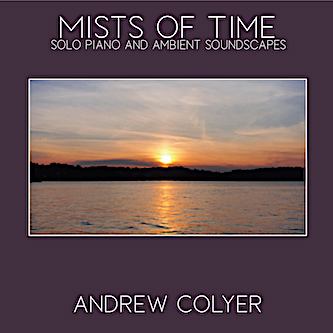 With its 12 tracks and sublime musical moods, Mists Of Time is the optimum introduction to the music of New York based composer and recording artist Andrew Colyer. Ostensibly New Age instrumental music played on acoustic piano with electronica backing, Mists Of Time is correctly subtitled as Solo Piano And Ambient Soundscapes. Interesting that Andrew recorded Mists Of Time in Red Hook New York, not too far away from Jan Hammer, the fabled jazz-fusion keyboardist who also has a studio in Upstate New York. With its detailed dynamics and its accent on melodic content, you might say that on Mists Of Time, Andrew Colyer is currently doing for solo piano what Jan Hammer has done for instrumental synth music well into the past. Inspired by those famous Windham Hill album covers—the Mists Of Time CD cover art may be generic but there’s nothing pretentious or contrived here. Speaking about the Mists Of Time album cover art, Andrew tells mwe3.com "We designed the cover art to resemble the classic Windham Hill album covers on purpose. I took the cover sunset photo myself, while sailing on the Hudson River." Clear as a bell and recorded with as much piano dynamism as possible, Mists Of Time was inspired by a number of artists including Brian Eno, although there’s nothing obscure about Andrew Colyer’s music on Mists Of Time. There's as much improvisation as well as composed music while, with no shortage of excellent musical ideas, Andrew never fails to instill his sonic imprint on this CD. Andrew Colyer’s Mists Of Time is a masterpiece of authentic-sounding piano and light synth keyboard magic.
With its 12 tracks and sublime musical moods, Mists Of Time is the optimum introduction to the music of New York based composer and recording artist Andrew Colyer. Ostensibly New Age instrumental music played on acoustic piano with electronica backing, Mists Of Time is correctly subtitled as Solo Piano And Ambient Soundscapes. Interesting that Andrew recorded Mists Of Time in Red Hook New York, not too far away from Jan Hammer, the fabled jazz-fusion keyboardist who also has a studio in Upstate New York. With its detailed dynamics and its accent on melodic content, you might say that on Mists Of Time, Andrew Colyer is currently doing for solo piano what Jan Hammer has done for instrumental synth music well into the past. Inspired by those famous Windham Hill album covers—the Mists Of Time CD cover art may be generic but there’s nothing pretentious or contrived here. Speaking about the Mists Of Time album cover art, Andrew tells mwe3.com "We designed the cover art to resemble the classic Windham Hill album covers on purpose. I took the cover sunset photo myself, while sailing on the Hudson River." Clear as a bell and recorded with as much piano dynamism as possible, Mists Of Time was inspired by a number of artists including Brian Eno, although there’s nothing obscure about Andrew Colyer’s music on Mists Of Time. There's as much improvisation as well as composed music while, with no shortage of excellent musical ideas, Andrew never fails to instill his sonic imprint on this CD. Andrew Colyer’s Mists Of Time is a masterpiece of authentic-sounding piano and light synth keyboard magic. 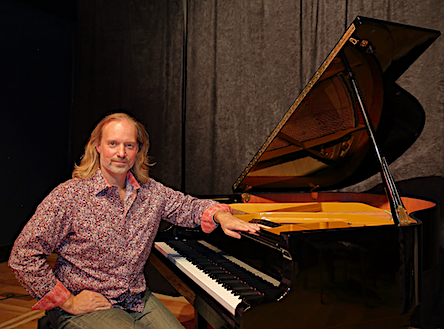 mwe3: Where were you born and where do you live now and what do you like best about it? What other cities and countries that you visited over the years, have impressed you the most? Even in this age of Covid, don’t you feel people still want to visit other towns, states and countries?
mwe3: Where were you born and where do you live now and what do you like best about it? What other cities and countries that you visited over the years, have impressed you the most? Even in this age of Covid, don’t you feel people still want to visit other towns, states and countries? There was a period of about 20 years that my “inner musician” was really depressed, because I didn’t follow that path to Berklee. During that time, due to life circumstances, music was always continually being put on the back burner, even though I kept trying to do things to move it to the front. That’s where Juilliard came in.
There was a period of about 20 years that my “inner musician” was really depressed, because I didn’t follow that path to Berklee. During that time, due to life circumstances, music was always continually being put on the back burner, even though I kept trying to do things to move it to the front. That’s where Juilliard came in.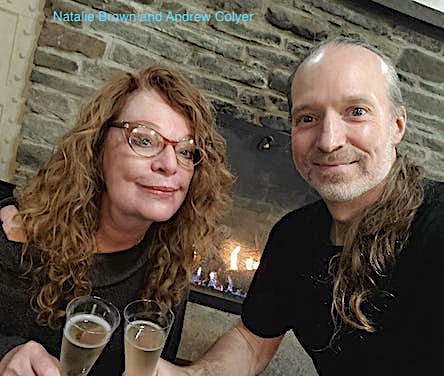 mwe3: How many solo albums have you recorded and released? You mentioned you had a Christmas album as well and a reissue of an earlier solo album on CD or digital? Tell us about your other solo albums and do you feel that Mists Of Time is your most accomplished solo album?
mwe3: How many solo albums have you recorded and released? You mentioned you had a Christmas album as well and a reissue of an earlier solo album on CD or digital? Tell us about your other solo albums and do you feel that Mists Of Time is your most accomplished solo album?  mwe3: You cite artists such as George Winston, Brian Eno and Peter Kater among your musical influences but would you say your sound and vision is more prog-rock oriented as compared to say New Age and how about your classical and jazz influences? Do you feel the jazz and classical styles come out in both the writing and performances as well and that kind of takes Mists Of Time and CircuLive::New View beyond New Age and Prog-rock?
mwe3: You cite artists such as George Winston, Brian Eno and Peter Kater among your musical influences but would you say your sound and vision is more prog-rock oriented as compared to say New Age and how about your classical and jazz influences? Do you feel the jazz and classical styles come out in both the writing and performances as well and that kind of takes Mists Of Time and CircuLive::New View beyond New Age and Prog-rock? mwe3: You also perform with Robert Berry, playing all kinds of progressive rock classics. What is it like playing with Robert, and tell us about future plans with 3.2 featuring Robert Berry?
mwe3: You also perform with Robert Berry, playing all kinds of progressive rock classics. What is it like playing with Robert, and tell us about future plans with 3.2 featuring Robert Berry?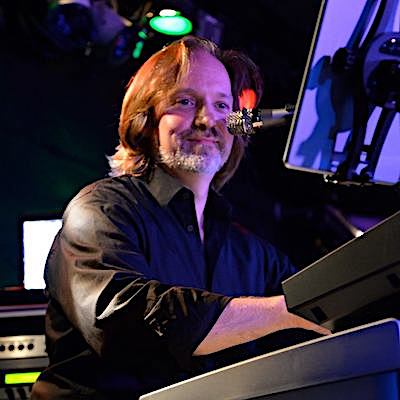 As far as the influences in my composing and playing, I just always love interesting chord progressions. I’m sure that’s why I love Tony Banks and Eddie Jobson so much. Jazz also is not afraid of dissonance as a harmonic tool. Remember that duality I spoke about? The dissonance resolves to consonance. It gives you a wider range of emotions to work with musically. Like a broader range of spices and herbs to cook with, or a larger palette of colors to paint with.
As far as the influences in my composing and playing, I just always love interesting chord progressions. I’m sure that’s why I love Tony Banks and Eddie Jobson so much. Jazz also is not afraid of dissonance as a harmonic tool. Remember that duality I spoke about? The dissonance resolves to consonance. It gives you a wider range of emotions to work with musically. Like a broader range of spices and herbs to cook with, or a larger palette of colors to paint with. 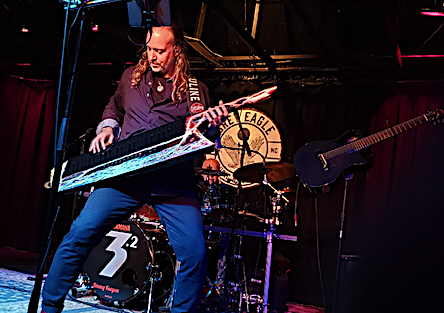 Andrew Colyer: In February 2014, progressive rock tribute band Downing Grey transmuted into the all-original band Circuline. Our debut album, Return, was released in April 2015, and based on the strength of that album, a northeastern tour opening for Glass Hammer, and our own traveling Sonic Voyage Fest, we were asked to be the “backup” band for the 2015 International Rites of Spring Festival (RoSfest). Fortunately for us, we weren’t needed, but we were pretty certain that we would be asked to perform at RoSfest 2016 - which we were, so we went straight back into the studio, because we had less than a year to produce our second album, which became Counterpoint.
Andrew Colyer: In February 2014, progressive rock tribute band Downing Grey transmuted into the all-original band Circuline. Our debut album, Return, was released in April 2015, and based on the strength of that album, a northeastern tour opening for Glass Hammer, and our own traveling Sonic Voyage Fest, we were asked to be the “backup” band for the 2015 International Rites of Spring Festival (RoSfest). Fortunately for us, we weren’t needed, but we were pretty certain that we would be asked to perform at RoSfest 2016 - which we were, so we went straight back into the studio, because we had less than a year to produce our second album, which became Counterpoint. 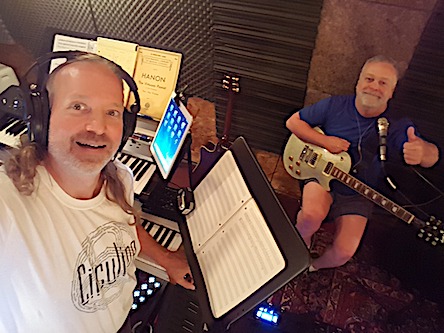 Andrew Colyer: Thank you for those kind words about the website. It’s an ever-evolving work in progress. I feel like our own websites should be the foremost authority on our careers, and we shouldn’t make potential fans or media professionals search on Google or Wikipedia to find information. Shouldn’t our own websites have the most information about our own careers? It’s a lot of work trying to keep up with everything, and I feel like I’m always behind. Maybe that’s why artists just let somebody else do it. Or at some point you just can’t keep up with everything. At this point in time, I’m not at the level where I can just let someone else be responsible for that.
Andrew Colyer: Thank you for those kind words about the website. It’s an ever-evolving work in progress. I feel like our own websites should be the foremost authority on our careers, and we shouldn’t make potential fans or media professionals search on Google or Wikipedia to find information. Shouldn’t our own websites have the most information about our own careers? It’s a lot of work trying to keep up with everything, and I feel like I’m always behind. Maybe that’s why artists just let somebody else do it. Or at some point you just can’t keep up with everything. At this point in time, I’m not at the level where I can just let someone else be responsible for that.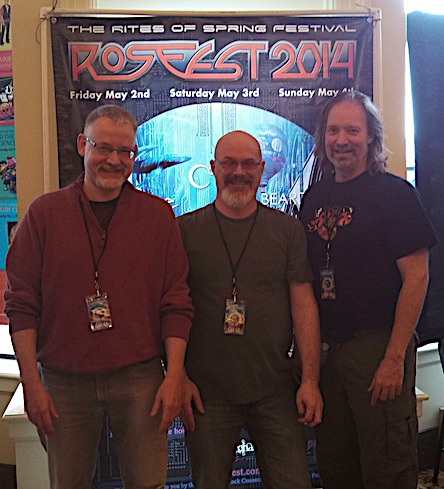 Andrew Colyer: Natalie Brown and I met in January 2013, and the chemistry was instant. Natalie’s stage presence comes from her 30 years as a Union actor/singer/dancer. She’s had the lead in Evita twice, she’s had her own sold-out solo shows, and she is a force to be reckoned with. I’m very lucky and grateful to have her in my life, and in my band. Natalie actually knew Billy before I did, as he was the lead singer in the Led Zeppelin tribute band No Quarter for seven years before joining Downing Grey, which morphed into Circuline. Those two have great ears, great ideas, and the three of us arrange the harmony parts for all the vocal sections of Circuline’s songs.
Andrew Colyer: Natalie Brown and I met in January 2013, and the chemistry was instant. Natalie’s stage presence comes from her 30 years as a Union actor/singer/dancer. She’s had the lead in Evita twice, she’s had her own sold-out solo shows, and she is a force to be reckoned with. I’m very lucky and grateful to have her in my life, and in my band. Natalie actually knew Billy before I did, as he was the lead singer in the Led Zeppelin tribute band No Quarter for seven years before joining Downing Grey, which morphed into Circuline. Those two have great ears, great ideas, and the three of us arrange the harmony parts for all the vocal sections of Circuline’s songs. Andrew Colyer: As I stated before, my family pushed me into health care. I attended Logan College of Chiropractic - now Logan University - for four years in the early 1990’s. I do really love helping people, and, being the hyperactive overachiever that I am, have a rather large skill set of over 20 different techniques, am certified in acupuncture, pain management, integrative medicine, and nutrition, and am trained to diagnose any health condition that walks into my office. I only see one person at a time, for 30-minute or one-hour appointments. Many people see me as their natural healing primary care physician. If I have to have a day job while growing a music career in mid-life, it’s a good gig to have. But it does consume 50+ hours a week. That’s why I have to be uber-efficient with my time. Owning my own business gives me the freedom and flexibility to be able to go on tour with Circuline, Robert Berry, or anyone else who calls.
Andrew Colyer: As I stated before, my family pushed me into health care. I attended Logan College of Chiropractic - now Logan University - for four years in the early 1990’s. I do really love helping people, and, being the hyperactive overachiever that I am, have a rather large skill set of over 20 different techniques, am certified in acupuncture, pain management, integrative medicine, and nutrition, and am trained to diagnose any health condition that walks into my office. I only see one person at a time, for 30-minute or one-hour appointments. Many people see me as their natural healing primary care physician. If I have to have a day job while growing a music career in mid-life, it’s a good gig to have. But it does consume 50+ hours a week. That’s why I have to be uber-efficient with my time. Owning my own business gives me the freedom and flexibility to be able to go on tour with Circuline, Robert Berry, or anyone else who calls.